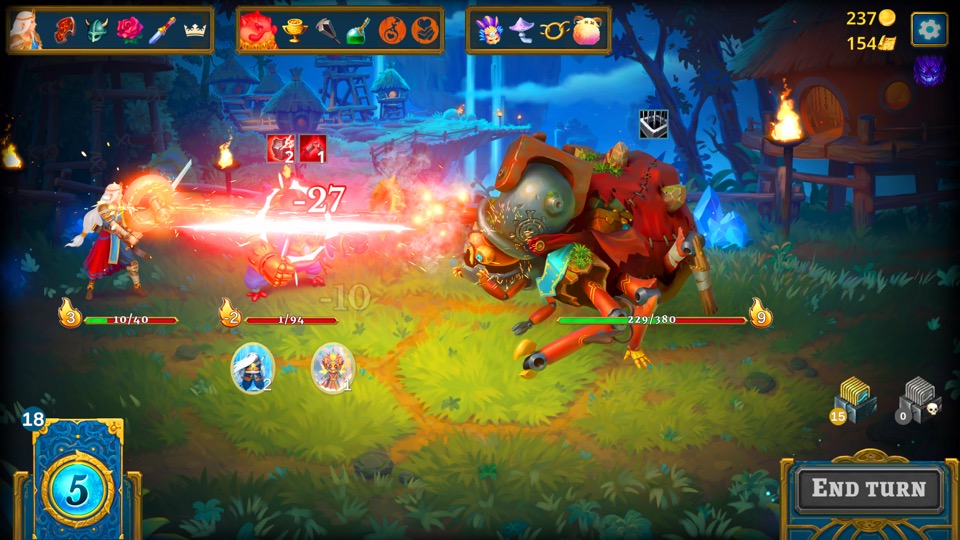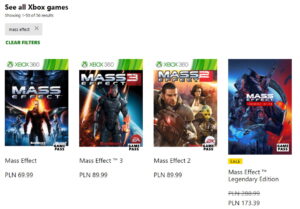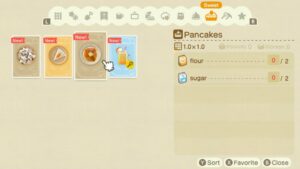If there’s one video game genre that imbues me we a sense of catatonic apathy it’s roguelike deck builders. Throughout my video game life I’ve actively avoided any game that would define itself in such a way. Indeed, like a conspiracy spewing Twitter addicted crackpot, I’ve effectively denied the genre’s very existence. The world is flat, vaccines are an excuse to insert tracking chips and roguelike deckbuilders aren’t real. Maybe I would have carried on floating around in my video game echo chamber were it not for being commanded to review Roguebook. Funnily enough, Roguebook is a roguelike deck builder and it also happens to be brilliant. It popped my proverbial bubble and I couldn’t be happier about it.
Your dynamic duo of fantastical heroes are trapped within the pages of the Roguebook. The eponymous tome will do its best to keep all those within it trapped forever. The only way route to freedom then is to defeat a formidable boss that guards access to the next page. To stand a chance, you’ll need to explore a map stuffed with helpful treasure and unhelpful foes. Thing is, to explore the map you’ll need to draw it into existence with a very important and exceedingly finite resource; pots of ink. Paint the page and you’ll uncover all sorts of secrets to help you on your way. Once the ink well is dry though, the rest of the map will remain forever hidden from view. All that’s then left to do is hope you’ve gathered enough cards and items to defeat the end of level boss.
This being a roguelike, you’re unlikely to beat that boss on your first run, forcing a restart. Thankfully on the next run you’ll benefit from being able to unlock a boost to your character’s base stats and abilities as well as expand your starting deck of cards. It’s a tried and tested mechanic and it’s one that works exceedingly well in the confines of Roguebook. The fact that ink is so limited means you have to be exceedingly strategic in its application, utilising a dab here or a splash there to access some tempting treasure tantalisingly out of reach.
It’s in the combat that Roguebook truly excels however, the 2D turn-based battles proving a tense and exciting affair. All your attacks are triggered via selecting cards from a deck. However, those same cards can also confer to a defensive pool that will need to be boosted to absorb your foes attacks. As such, each turn offers a strategic conundrum, do you get stuck in with an attack or two or do you opt for defense – after all, opportunities to heal your heroes come few and far between in Roguebook. Ultimately this mechanic proves insanely addictive, something about the attack/defence balancing act just made my brain itch. The euphoria that was released upon figuring out how to solve that problem and successfully scratching the strategic itch was simply sublime.

Cards are interesting and varied in their attributes and possible use. Each of the four heroes – from a fast and deadly warrior to a rage-fuelled demon rat dude – have their own unique cards and functions. Sorocco, the flame-breathing first mate, is all about support, defence and flattening enemies with his potent posterior. Whilst Auroroa, a magic spewing turtle no less, is best used boosting her ally and summoning frogs to do her bidding. Suffice to say, with such a diverse range of characters and cards to choose from, there’s a vast array of strategies on offer here. The game will tell you what your enemies are going to do next, the trick is to use all of the cards, abilities and items at your disposal in tandem to be able to counter it.
If all that weren’t enough to think about, then there’s the fact that the two heroes under your command fight in formation; one on the front line and the other in a supporting role behind. Certain characters receive boosts for fighting in specific positions. Cards will also swap your characters round or only work in certain positions. As such, battles encourage your brain into some kind of deep flow state. You’ll be constantly thinking two moves ahead as your carefully placed cards send your characters into something akin to a deadly dance of destruction, swapping back and forth to optimum effect, Well, mostly. On other occasions it all goes a bit wrong and everyone dies. But, that’s all part of the fun, right?
With each level being procedurally generated there is the occasional issue that some runs are doomed to failure, you simply can’t get the cards you need to take out that pesky second boss, no matter how hard you try. To counter this, the game allows you to drop out of a run at any time but, until you learn to spot the signs of a doomed run, this can feel like an irritating waste of time. Mostly though, the balance is just right, ensuring you get a bit further on each run and are desperate to get back to it and have another crack at that boss as, this time, you’ll definitely win.

Aesthetically Roguebook is lovely to look at, the sumptuous painterly visuals are a delight. Whilst the diverse range of foes you battle with are also absolutely charming. You’ve not lived until you have fought a cuddly yak firing catapult operated by a bunch of care bears.
Even better though are the controls. I’ve grown to dread PC to console conversions of turn-based strategy games, as the control schemes are often so befuddling bad it makes my brain boil. Roguebook elegantly avoids that problem with well-considered controls that are precise and easy to grasp. Sure, the text can be a tad hard to read, but for a game this fun I’m prepared to sit in front of a telly like an overly excited five-year-old watching Ninjago.
- "
- abilities
- About
- access
- All
- Another
- Application
- around
- Battle
- Bears
- BEST
- Bit
- Boosted
- boosting
- bubble
- builder
- Bunch
- Cards
- care
- characters
- Chips
- Console
- Conspiracy
- conversions
- dab
- defence
- Defense
- Drop
- echo
- Expand
- Failure
- FAST
- First
- flow
- Freedom
- fun
- game
- Games
- here
- hidden
- How
- How To
- HTTPS
- i
- important
- IT
- launch
- LEARN
- Level
- Limited
- Line
- map
- offer
- Offers
- opportunities
- Other
- paint
- PC
- pool
- possible
- proves
- ps4
- ps5
- range
- RAT
- receive
- released
- resource
- REST
- review
- Route
- Run
- sense
- Signs
- So
- SOLVE
- Spot
- State
- stats
- Strategic
- Strategies
- Strategy
- support
- text
- The
- the world
- Thinking
- time
- Tracking
- uncover
- unique
- unlock
- vaccines
- Video
- View
- waste
- What
- win
- within
- Work
- works
- world
- youtube











